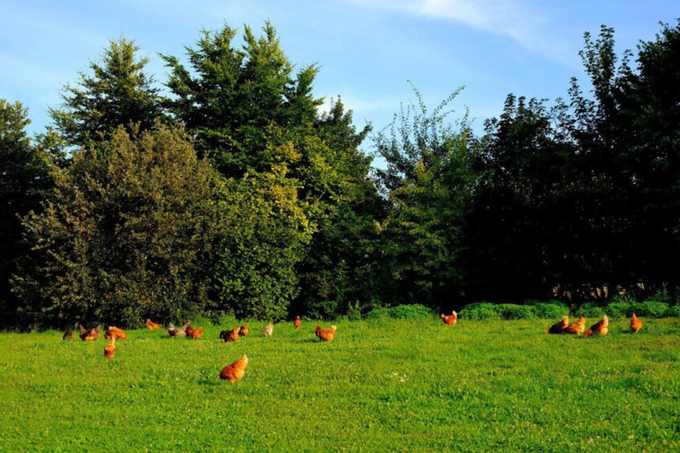November 26, 2025 | 13:20 GMT +7
November 26, 2025 | 13:20 GMT +7
Hotline: 0913.378.918
November 26, 2025 | 13:20 GMT +7
Hotline: 0913.378.918

Photo: Holger Schué
Scientists simulated a free-range environment in laying hen housing and found that showing hens virtual reality scenes of birds in more “natural” environments reduced indicators of stress in the hens’ blood and gut microbiota. The virtual reality scenes also induced biochemical changes related to increased resistance to E. coli bacteria.
“It is intriguing to think that even just showing hens free-range environments can stimulate similar immunological benefits.”
The pilot study, reported in the peer-reviewed journal Frontiers of Science, involved the displaying of video projections of chickens in free-range environments. Scenes showed indoor facilities with access to an outdoor fenced scratch area and unfenced open prairie with grasses, shrubs and flowers.
The 5-day study of hens during peak stress period
A group of 34 hens from commercial poultry flocks were exposed to the videos over 5 days on all 4 walls of their housing. The videos were tested during a high-risk period for stress – 15 weeks after hatching when the hens were moving from pullet to egg-laying facilities.
The visual-only recordings showed diverse groups of free-range chickens performing a range of positive poultry behaviours, such as perching, dust-batching, preening and nesting. Videos were not shown to a control group of the same size and age in the same type of housing.
Beneficial effects
Results showed that chickens in the treatment group showed several beneficial changes compared to the control group. Differences included an increased resistance to avian pathogenic E. Coli bacteria that can cause sepsis and death in young birds.
Co-lead author Melha Mellata, associate professor in the Department of Food Science and Human Nutrition, said: “There are many challenges associated with free-range production environments for laying hens, including potential for additional injuries, disease and risks from predators. However, hens in free-range environments do tend to engage more often in positive, normal behaviours that seem to enhance their overall health and immunity.”
Mellata added that it is intriguing to think that even just showing hens free-range environments can stimulate similar immunological benefits. “It could also be a relatively inexpensive way to reduce infections and the need for antibiotics in egg production,” Mellata said.
Future research focus
Future collaborative research is likely to investigate the neurochemical mechanisms linking the visual stimuli to changes in the chickens’ intestines.
AI prevention and innovative biosecurity measures
Lasers are being trialled on a Dutch free-range poultry farm to see if they can remove the threat of avian influenza contamination from wild birds.
Research into the use of lasers as a repellent for wild birds has been taking place since the 1970s, first as birdstrike prevention at airfields and then for dispersing wild birds causing agricultural crop damage. Dr Armin Elbers, senior epidemiologist at Wageningen University and Research, said the current study was looking at scaring wild ducks and other wild birds through a laser on a platform 6 metres above ground level. Speaking at an International Egg Commission (IEC) webinar, Dr Elbers said the free-range area is lasered between 5pm and 10am, with the surrounding pasture (up to 600 metres away) lasered at the same times.
Preliminary results
No wild birds were seen during the day in the surrounding pastures when the laser was in operation. The poultry farmer described the lack of geese as “stunning”.
Far fewer Eurasian wigeons and mallards were encountered in the large waterway about 250m away from the free-range area barn while the laser was operative.
Grass in the surrounding pastures was much more abundant due to the lack of geese feeding.
Without the laser, wild ducks quickly returned to the waterway.
Dr Elbers mentioned that after the first night, there were no mallards present once the laser had been switched on. Without the use of the laser, mallards visited virtually every night.
(Poultryworld)

(VAN) A new study reveals how the simultaneous effects of ocean acidification, salinity and loss of oxygen are making the world more fragile.

(VAN) Hopes are growing that the creation of the first 3D turkey gut model could be a turning point in the battle against the virulent blackhead disease.

(VAN) Tyson, America’s biggest meat supplier, plans to shutter one of its largest beef processing plants as the industry continues to struggle with low cattle supplies and political pressure from Washington.

(VAN) New FAO study shows how digital solutions are empowering farmers and fishers to prevent losses and build resilient agrifood systems.

(VAN) Brazil's COP30 presidency pushed through a compromise climate deal on Saturday that would boost finance for poor nations coping with global warming but that omitted any mention of the fossil fuels driving it.

(VAN) Poultry farmers in the UK have been warned that they could face one of the worst winters yet for bird flu.

(VAN) Prices of main-crop paddy have risen sharply, with jasmine rice hitting 16,100 baht per tonne — the highest level in years.